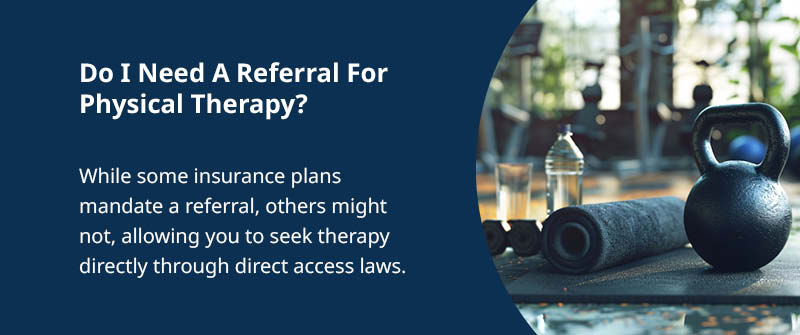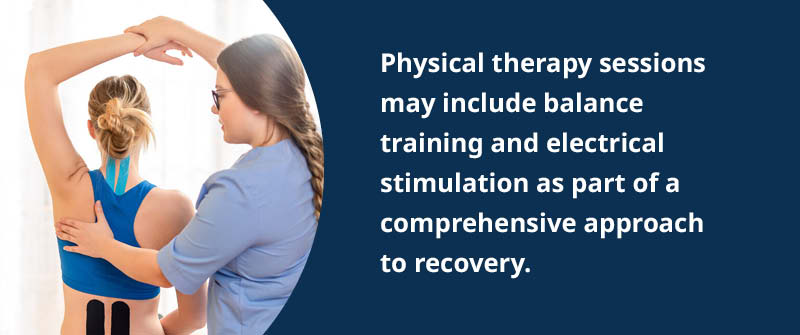How To Get Physical Therapy After A Car Accident?
Experiencing a car accident can be both physically and emotionally taxing. Ensuring you receive appropriate physical therapy can significantly aid in your recovery process and help you get back on track. Understanding the steps required to access physical therapy after an auto accident is essential for a smoother recovery process.
Schedule your appointment today at Bull City PT’s Charlotte, Durham or Brier Creek office to schedule physical therapy!
Blog: Do I Need a Referral for Physical Therapy After a Car Accident? Steps to Take Immediately
The first few moments post-accident are crucial for gathering important details. It is essential to have a thorough check-up from an emergency healthcare provider to assess injuries. Immediate medical attention is vital for identifying acute injuries and ensuring proper medical care, which can significantly impact your recovery. Prompt medical attention can help address immediate injuries and prevent further complications. Regardless of how minor an injury may seem, having professional medical documentation can be pivotal for future therapy sessions and settlement discussions. Remember, early intervention often leads to better outcomes in recovery.
Contacting A Healthcare Provider
Once the immediate health concerns are addressed, the next step is to contact your primary healthcare provider or primary care physician, or in some cases, a specialist recommended by your emergency care team. They will guide you on the necessity of physical therapy and can provide referrals if required. Ensure that your healthcare professional is informed about all symptoms, including any pain or lack of mobility, as this will aid in developing an effective treatment plan. It is important to communicate with all relevant healthcare providers to ensure coordinated care.
Documentation Required For Therapy
Proper documentation is fundamental in ensuring your therapy needs are met efficiently. This includes medical records from your initial assessment, documentation of all injuries sustained, and insurance information. It is important to provide your auto insurance details, including personal injury protection coverage, to your insurance company to ensure all benefits are properly accessed. Be sure to keep a personal log of your symptoms and any discussions with medical professionals or insurance providers. Proper documentation is essential for claiming medical expenses, medical costs, and lost wages related to the accident. Having organized documents can expedite the process of obtaining therapy and align it seamlessly with any ongoing settlement processes related to the accident.
Do I Need A Referral For Physical Therapy?
If you’re considering physical therapy after a car accident, or are seeking physical therapy promptly after your accident, understanding whether you need a referral can significantly affect your journey to recovery. While some insurance plans mandate a referral, others might not, allowing you to seek therapy directly through direct access laws. Starting physical therapy as soon as possible is important to begin the recovery process and prevent long-term complications. It’s crucial to be aware of your specific insurance provider’s requirements and state regulations to avoid any unexpected hurdles in your treatment plan. Make sure your medical treatment is properly documented for insurance purposes to ensure coverage of injury-related expenses.

Provider-Specific Referral Requirements
Your insurance provider plays a pivotal role in determining whether a referral is necessary. If you’re insured through Blue Cross Blue Shield, many of their plans offer direct access to physical therapy without requiring a referral, but this can vary based on the specific plan. Similarly, Medicare typically requires a physician’s referral to cover therapy sessions, though some states allow for a trial period of direct access. For providers like United HealthCare and Aetna, whether a referral is needed often depends on the plan type, with some plans offering direct access options.
Always verify with your insurance provider to align with both state laws and insurance rules, ensuring your sessions are covered. It is also important to communicate directly with your insurance company to clarify coverage details, including what treatments are included and any documentation required for claims.
State-Specific Regulations
State regulations are another critical factor to consider. Some states have enacted direct access laws that allow patients to receive physical therapy without a referral from a physician. These laws aim to reduce barriers to care, enabling faster access to therapy. It’s important to check your state’s specific rules on direct access to ensure compliance and streamline your recovery process.
Direct Access Laws
Direct access laws can significantly impact how you pursue physical therapy. They empower patients by eliminating the need for physician referrals and facilitating more immediate treatment. However, even in states where direct access laws exist, insurance companies may still impose their referral requirements. Always verify with your insurance provider to align with both state laws and insurance rules, ensuring your sessions are covered.
In conclusion, whether you need a referral for physical therapy largely depends on your insurance provider and state regulations. Understanding these can help you navigate through the process seamlessly, allowing you to focus on your recovery after a car accident with fewer complications.
What Type Of Therapy Might Be Necessary After A Car Accident?
After a car accident, the type of therapy you might need can vary based on the nature and severity of your injuries. Most often, physical therapy is recommended to help with recovery, reduce pain, and restore mobility. Physical therapy aims to improve mobility, restore function, and promote healing by addressing the root causes of pain and movement limitations.
Physical therapy helps reduce inflammation, manage pain, and support tissue repair as part of the healing process, which accelerates recovery and prevents further complications. Effective pain management and pain relief are central to physical therapy, contributing to overall well-being and physical health. In addition to physical benefits, physical therapy can also improve mental health by reducing feelings of isolation and supporting emotional recovery after an accident.
Comprehensive care is essential for addressing both immediate injuries and long-term consequences, such as preventing chronic pain, secondary injuries, and future complications. By supporting the way the body heals, physical therapy reduces the risk of long-term complications, addresses mobility issues and chronic pain, and helps ensure a smoother recovery process.
Common Injuries Requiring Therapy
Car accidents can lead to a range of injuries that necessitate therapy. These car accident injuries may include specific injuries such as soft tissue damage, muscle strains, broken bones, neck pain, and even spinal cord trauma. Some of the most common injuries include whiplash, back and neck injuries, fractures, and soft tissue injuries. Whiplash often requires specific physical therapy techniques to relieve pain and improve neck movement. Back injuries might require more intensive rehabilitation, focusing on strengthening the back muscles to prevent further injury and alleviate pain. Addressing spinal alignment and strengthening the surrounding muscles is also crucial for supporting recovery and preventing complications.

Different Therapy Modalities
Depending on your particular injuries, a variety of therapy modalities may be recommended. Physical therapy sessions may include balance training and electrical stimulation as part of a comprehensive approach to recovery. These can include manual therapy, exercises tailored to your injury, heat and cold treatments, and sometimes even occupational therapy to help you adapt to any limitations. Manual therapy involves hands-on techniques to improve muscle function and joint movement, while targeted exercises can help restore strength and flexibility.
Recovery Timelines And Expectations
The timeline for recovery can differ based on the severity of your injuries and how your body responds to physical therapy. Some individuals may see improvements in just a few weeks, while others may require several months of therapy to achieve optimal recovery. Setting realistic expectations and maintaining regular therapy sessions are key to seeing progress and avoiding setbacks. Neglecting therapy can lead to untreated injuries, which may result in long-term complications and hinder your car accident recovery. Ongoing therapy after a car accident is essential to restore mobility, alleviate pain, and promote overall health.
Request an appointment and embrace a tailored therapy approach with Bull City PT, where our experienced professionals craft personalized recovery plans to address your specific needs post-accident. Begin your journey towards mobility and resilience today with our dedicated team.



